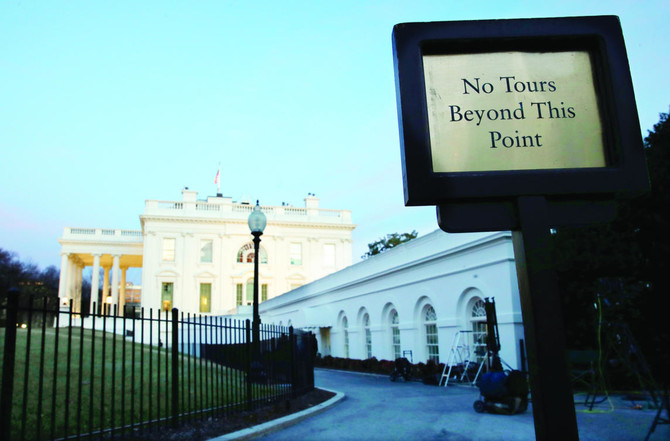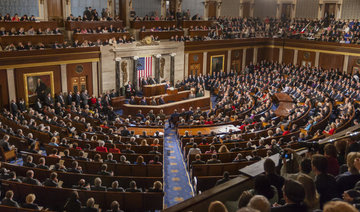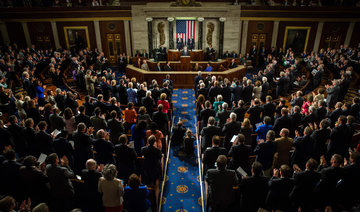WASHINGTON: Feuding Democrats and Republicans in Congress are trying to dodge blame for a paralyzing standoff over immigration and showing few signs of progress on negotiations needed to end a government shutdown that stretched into a second day Sunday.
The finger-pointing played out in rare weekend proceedings in both the House and Senate, where lawmakers were eager to show voters they were actively working for a solution — or at least actively making their case why the other party was at fault. The scene highlighted the political stakes for both parties in an election-year shutdown whose consequences are far from clear.
“The American people cannot begin to understand why the Senate Democratic leader thinks the entire government should be shut down until he gets his way on illegal immigration,” said Senate Majority Leader Mitch McConnell, R-Kentucky, hours after a last-chance Senate vote failed.
Democrats refused to provide the votes needed to reopen the government until they strike a deal with President Donald Trump protecting young immigrants from deportation, providing disaster relief and boosting spending for opioid treatment and other domestic programs.
Democrats feel “very, very strongly about the issues” said Sen. Chuck Schumer of New York, the Democratic leader, adding that he believes “the American people are on our side.”
The fighting followed a late Friday vote in which Senate Democrats blocked a House-passed measure that would have kept agencies functioning for four weeks.
Republicans began Saturday hopeful they might pick off Democratic support for a three-week version and bring the episode to a quick end. Democrats are insisting on an alternative lasting only several days — which they think would pressure Republicans to cut an immigration deal — and say they will kill the three-week version when the Senate votes on it by early Monday.
The shutdown came on the anniversary of Trump’s inauguration. As lawmakers bickered in the Capitol, protesters marched outside in a reprise of the women’s march from a year ago. The president remained out of sight and canceled plans to travel to his resort in Florida for the weekend. He did tweet, making light of the timing by saying Democrats “wanted to give me a nice present” to mark the start of his second year in office.
And he resumed his social media commentary early Sunday, before lawmakers returned to Capitol Hill, tweeting that it was “Great to see how hard Republicans are fighting for our Military and Safety at the Border. The Dems just want illegal immigrants to pour into our nation unchecked.” He suggested that if the stalemate drags on, majority Republicans should consider changing Senate rules to do away with the 60-vote threshold to advance legislation and “vote on real, long term budget.”
Trump earlier had worked the phones, staying in touch with McConnell, while White House legislative affairs director Marc Short and budget chief Mick Mulvaney met at the Capitol with House Republicans. GOP lawmakers voiced support for the White House stance of not negotiating while the government was shuttered.
Tempers were short and theatrics high.
Lawmakers bickered over blame, hypocrisy and even the posters brought to the House floor. While neither chamber voted on a measure to open the government, the House did vote on whether a poster displayed by Republican Rep. Bradley Byrne of Alabama violated the House rules on decorum. The House voted to allow the poster, which bore a photo of Schumer and the quote “the politics of idiocy.”
Republicans blamed the breakdown on Schumer. Democrats increasingly focused their messaging on criticizing Trump, whose popularity is dismal. Democrats were using his zigzagging stance in immigration talks — first encouraging deals, then rejecting them — to underscore his first, chaotic year in office.
“Negotiating with President Trump is like negotiating with Jell-O,” Schumer said.
Short compared Democrats’ actions to “a 2-year-old temper tantrum.”
Republicans seemed content to hope additional Democrats will break as pressure builds and the impact of the shutdown becomes clearer. GOP lawmakers argued that Democrats were blocking extra Pentagon money by keeping government closed and thwarting a long-term budget deal.
But pressure on Republicans could mount when the new business week begins and the impact becomes more apparent to the public.
The Statue of Liberty and Philadelphia’s Liberty Bell were closed, but visitors had access to other sites such as Yellowstone. Interior Secretary Ryan Zinke tweeted a photo of him talking to students at the World War II Memorial in Washington, blocks from White House.
Social Security and most other safety-net programs were unaffected by the lapse in federal spending authority. Critical government functions continued, with uniformed service members, health inspectors and law enforcement officers set to work without pay. But if no deal is reached before Monday, hundreds of thousands of federal employees will be furloughed.
For leverage, Democrats were banking on Trump’s wobbly presidency and the GOP’s control of the White House, the House and Senate — a triumvirate that until now had never allowed a government closure to occur.
House Minority Leader Nancy Pelosi, D-Calif., called Republicans “so incompetent and negligent that they could not get it together to keep the government open.”
Democrats have been seeking a deal to protect so-called Dreamers. About 700,000 of them have been shielded against deportation by the Deferred Action for Childhood Arrivals program, or DACA, which Trump halted last year. He has given lawmakers until early March to pass legislation restoring the protections, but he has demanded added money for his proposed border wall with Mexico as a price.
Democrats, GOP swap charges of blame for shutdown
Democrats, GOP swap charges of blame for shutdown

Uruguay votes for next president in closely fought runoff race

- Final opinion polls suggest the Nov. 24 runoff promises to be razor tight
- Fewer than 25,000 votes potentially separating the frontrunners
The vote in the small nation of 3.4 million people sees opposition center-left candidate Yamandu Orsi take on continuity conservative runner, Alvaro Delgado, who has the backing of a third-placed ally.
Final opinion polls suggest the Nov. 24 runoff promises to be razor tight, with fewer than 25,000 votes potentially separating the frontrunners.
Unlike sharp right-left divides in recent elections in Argentina, Brazil or Mexico, Uruguay’s political arena is relatively tension-free, with significant overlap between the conservative and liberal coalitions vying for office, taking some of the sting out of Sunday’s final result.
Ballot stations open at 8 a.m. (1100 GMT) and close at 7:30 p.m. local time, with first results expected two hours later.
Orsi, who has pledged a “modern left” policy approach, won 43.9 percent of the October vote for the Broad Front and will face Delgado, who secured 26.8 percent but also has the backing of the conservative Colorado Party that together with his National Party made up almost 42 percent of votes. The two parties did the same in 2019, winning the election.
Orsi has sought to reassure Uruguayans that he does not plan a sharp policy shift in the traditionally moderate and relatively wealthy nation.
Delgado meanwhile has asked voters to “re-elect a good government,” seeking to capitalize on the popularity of President Lacalle Pou, who constitutionally cannot run for immediate re-election.
Neither coalition has an absolute majority in the lower house following October’s elections. But Orsi’s Broad Front won 16 of 30 Senate seats. He argues his senate majority places him in a better position to lead the next government.
Both contenders on Sunday are hoping to attract the roughly 8 percent of first-round voters who went for smaller, unaligned parties, as well as those who failed to turn out in October.
But neither has made new pledges in the final weeks to appeal to them, and pollsters say a televised debate on Nov. 17 appears to have had little effect.
“I don’t know who I’m voting for,” said Rosario Gusque, 42, from the region of Canelones where Orsi was previously mayor. “Even less so after seeing the debate.”
One question as the biggest year for elections in history comes to an end is whether Uruguay will buck a global trend of incumbent parties losing vote share compared with the previous election. Voters hurt by inflation and high living costs have punished parties in power, including in Britain, Japan and the United States.
A robust Uruguayan economy though could help Delgado on Sunday: “There are few indications that voters are clamoring for significant political change,” said Uruguayan analyst Nicolas Saldias of the Economist Intelligence Unit.
82 killed in three days of Pakistan sectarian violence: official

“Among the deceased, 16 were Sunni, while 66 belonged to the Shia community,” said a local administration official in Kurram district of Khyber Pakhtunkhwa province, speaking on condition of anonymity.
Pakistan is a Sunni-majority country but Kurram district — near the border with Afghanistan — has a large Shiite population and the communities have clashed for decades.
The latest bout of violence began on Thursday when two separate convoys of Shiite Muslims traveling under police escort were ambushed, killing at least 43 and sparking two days of gunbattles.
“Our priority today is to broker a ceasefire between both sides. Once that is achieved, we can begin addressing the underlying issues,” provincial Law Minister Aftab Alam Afridi said Sunday.
Pakistan partially stops mobile and Internet services ahead of pro-Imran Khan protest

- Sunday’s protest is to demand Khan’s release
- The government is imposing social media platform bans and targeting VPN services, according to monitoring service Netblocks
ISLAMABAD: Pakistan Sunday suspended mobile and Internet services “in areas with security concerns” as supporters of imprisoned former premier Imran Khan geared up for a protest in the capital.
The government and Interior Ministry posted the announcement on social media platform X, which is banned in Pakistan. They did not specify the areas, nor did they say how long the suspension would be in place.
“Internet and mobile services will continue to operate as usual in the rest of the country,” the posts said. A spokesperson for the Interior Ministry was not immediately available for comment.
Khan has been in prison for more than a year and has over 150 criminal cases against him. But he remains popular and his political party, Pakistan Tehreek-e-Insaf or PTI, says the cases are politically motivated.
His supporters rely heavily on social media to demand his release and use messaging platforms like WhatsApp to share information, including details of events.
Pakistan has already sealed off the capital Islamabad with shipping containers and shut down major roads and highways connecting the city with PTI strongholds in the provinces of Punjab and Khyber Pakhtunkhwa.
The government is imposing social media platform bans and targeting VPN services, according to monitoring service Netblocks. On Sunday, Internet-access advocacy group, Netblocks said live metrics showed WhatsApp backends are restricted in Pakistan, affecting media sharing on the app.
Last month, authorities suspended the cellphone service in Islamabad and Rawalpindi to thwart a pro-Khan rally. The shutdown disrupted communications and affected everyday services such as banking, ride-hailing and food delivery.
Fire rips through slum area in Philippine capital

- Manila Fire District said around 1,000 houses were destroyed in the blaze
- The structures housed around 2,000 families, according to the fire department
MANILA: Raging orange flames and thick black smoke billowed into the sky Sunday as fire ripped through hundreds of houses in a closely built slum area of the Philippine capital Manila.
Manila Fire District said around 1,000 houses were burned in the blaze that is thought to have started on the second floor of one of the homes.
There were no immediate reports of casualties.
Drone footage shared online by the city’s disaster agency showed houses in Isla Puting Bato village of Manila razed to the ground.
The structures housed around 2,000 families, according to the fire department.
Village resident Leonila Abiertas, 65, lost almost all her possessions, but managed to save her late husband’s ashes.
“I only got the urn with the ashes of my husband,” a crying Abiertas said.
“I really don’t know how I can start my life again after this fire.”
Fire and disaster services deployed 36 trucks and four fire boats while the country’s airforce sent in two helicopters to help extinguish the fire.
“That area is fire-prone since most of the houses there are made of light materials,” firefighter Geanelli Nunez said.
Turkiye’s Erdogan to discuss Ukraine war with NATO chief

ANKARA: Turkish President Tayyip Erdogan will discuss the latest developments in the Russia-Ukraine war with NATO Secretary General Mark Rutte on Monday during his visit to Ankara, a Turkish official said on Sunday.
Russia struck Ukraine with a new hypersonic medium-range ballistic missile on Thursday in response to Kyiv’s use of US and British missiles against Russia, marking an escalation in the war that began when Moscow launched a full-scale invasion of its neighbor in February 2022.
NATO member Turkiye, which has condemned the Russian invasion, says it supports Ukraine’s territorial integrity and it has provided Kyiv with military support.
But Turkiye, a Black Sea neighbor of both Russia and Ukraine, also opposes Western sanctions against Moscow, with which it shares important defense, energy and tourism ties.
On Wednesday, Erdogan opposed a US decision to allow Ukraine to use long-range missiles to attack inside Russia, saying it would further inflame the conflict, according to a readout shared by his office.
Moscow says that by giving the green light for Ukraine to fire Western missiles deep inside Russia, the US and its allies are entering into direct conflict with Russia. On Tuesday, Putin approved policy changes that lowered the threshold for Russia to use nuclear weapons in response to an attack with conventional weapons.
During their talks on Monday, Erdogan and Rutte will also discuss the removal of defense procurement obstacles between NATO allies and the military alliance’s joint fight against terrorism, the Turkish official said.


















